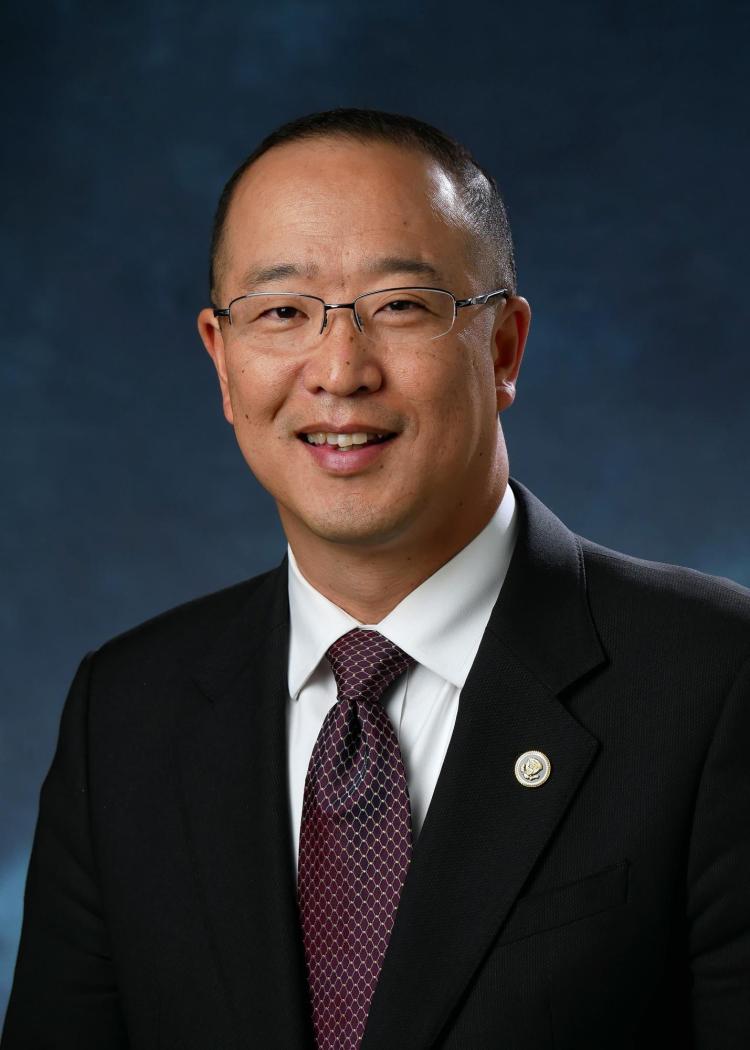Campus Q&A: VC Kang talks sustainability ahead of Climate Leadership Conference appearance
Vice Chancellor for Infrastructure and Sustainability David Kang on Thursday will be participating on a panel at the C2ES Climate Leadership Conference in Denver.

Vice Chancellor for Infrastructure and Sustainability David Kang
The annual conference, which runs today through Friday, “brings together climate, energy and sustainability professionals from around the globe to address climate change through policy, innovation and business solutions.” Gov. John Hickenlooper and New Belgium Brewing co-founder Kim Jordan are among the keynote speakers.
Kang will join Dan Firger from Bloomberg Philanthropies; International Emissions Trading Association CEO Dirk Forrester; and David Hayes, executive director of the State Energy and Environmental Impacts Center at New York University, on a panel discussing how industry, municipalities, universities and others are addressing climate issues.
Conference keynotes and panels will be livestreamed, with Kang’s panel beginning at 8:30 a.m. Thursday.
CU Boulder Today sat down with Kang recently to talk about the conference, CU Boulder’s involvement in the University Climate Change Coalition and other sustainability topics.
Tell us about the Climate Leadership Conference and what you’ll be speaking about there.
The conference is a gathering of sustainability expertise, ideas and best practices. We’re lucky to have the conference in Denver this year, as it provides a backdrop to showcase some of the great sustainability initiatives going on in our own state to leaders from around the world.
The panel I’m on includes a diverse group of participants. I’ll be speaking about the role of universities in addressing humanity’s challenges, including climate. Not only are our universities teaching the next generation of impactful citizens and leaders, but our research solves problems and provides better understanding of many of these challenges. With my background in the Navy, I’ll also be speaking about national security and how it’s impacted by climate, energy, sustainability and resiliency.
CU Boulder and 12 other research universities recently announced they were launching the University Climate Change Coalition (UC3). What is UC3, and why is CU Boulder’s participation in the effort significant?
UC3 will foster an exchange of best practices and lessons learned among leading research universities so they can apply that collective expertise in helping communities and businesses reach their own carbon-reduction goals.
CU Boulder’s membership fits with the university’s desire to impact humanity. It is also a nod to our leadership in the climate, earth and environmental sciences; our proximity to—and collaboration with—federally funded labs; and to the city of Boulder’s status as an entrepreneurial hub and the key role the university plays in that.
What is the university hoping to accomplish by being part of UC3?
CU Boulder has an established track record of working with industry and communities on sustainability issues. That includes everything from helping ensure impactful discoveries make it to the marketplace to partnerships like the Sustainability Alliance, a group the university, the city of Boulder, Boulder County and the Boulder Valley School District jointly formed in 2009 as a common commitment to addressing sustainability issues.
Universities are generally well-respected in their communities, so it becomes natural for us to bring folks together from industry, government and the public to facilitate discussions around these issues. The pooling of resources that will occur through our UC3 membership will help augment these efforts, as well as create new opportunities.
Talk about the recent name change for your organization to the Office of the Vice Chancellor for Infrastructure and Sustainability.
While it had to do partly with organizational changes, the name change also elevates and highlights sustainability in a way that matches the priority level already given to it by our campus.
From an infrastructure standpoint, sustainability is intertwined with everything we do, from how we operate, retrofit and construct buildings to how we plan for the future of campus. It’s not just about the initiatives themselves. But it’s also about saving money, using resources more efficiently, enhancing resiliency and leading by example in the community. We are also focused on how we can more closely integrate sustainability, education, research and operations into a seamless and well-coordinated effort that is enduring, collaborative and impactful.
How can universities work locally to drive sustainability?
There are a number of ways the university can help in this regard. One is through our research by making sure communities are empowered with accurate, verifiable data that helps them make decisions related to their own sustainability goals.
Another big one, as I mentioned before, is to lead by example, whether that’s by being an early adopter of new technology that increases our efficiency and resiliency or programs like Ralphie’s Green Stampede that simultaneously illustrate our commitment to sustainability and educate the community on sustainable practices.
What are some of the high-level sustainability-related initiatives the infrastructure and sustainability organization is working on?
We’ve talked about UC3. Another is transportation master planning. How do we optimize transportation in, around and to campus in ways that are more efficient, more sustainable and more convenient for all of our students, faculty and staff? And how can we work with our partners in our communities, industry and the state to develop mutually beneficial local and regional transportation solutions?
Resiliency is also an aspect we like to focus on with every project in our office. That’s a broad topic, but largely it entails updating our infrastructure and improving our energy security in ways that protect critical research and ensure the university’s mission of education and research can continue or recover quickly, even when faced with the worst of circumstances such as the 2013 flood. We also talk about community resiliency as we work to develop an integrated microgrid on our East Campus that will serve as a living sustainability laboratory promoting efficiency, integration of smart technologies and clean energy, and protecting critical infrastructure to better serve our community.


